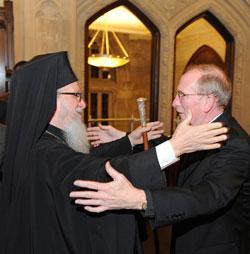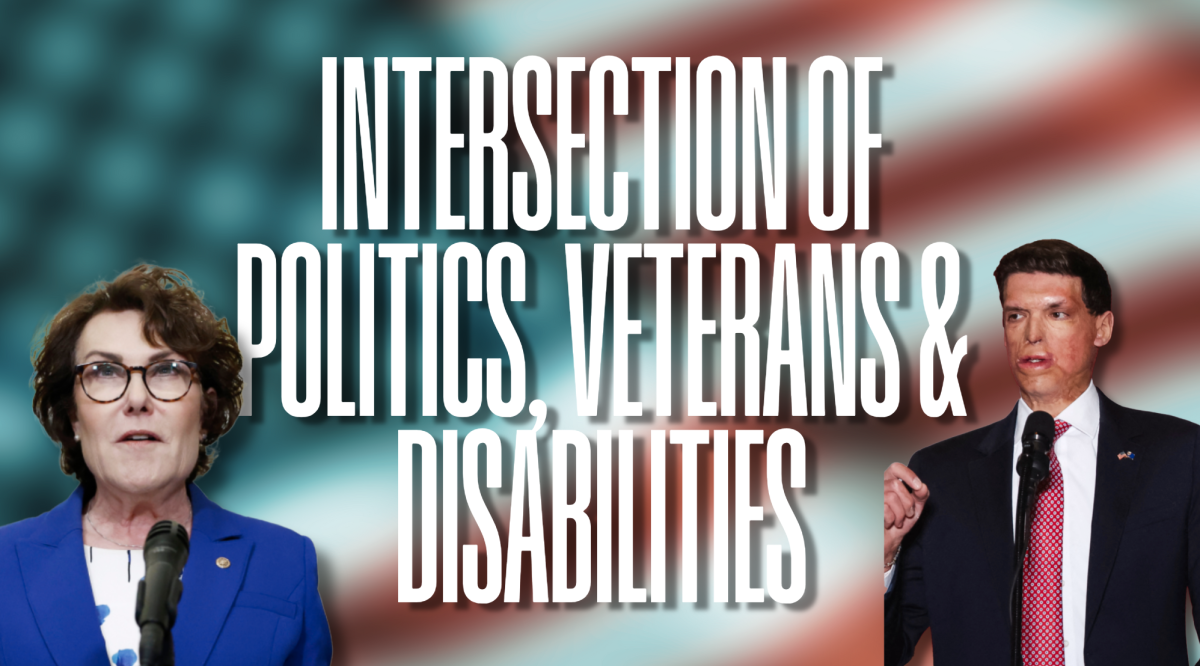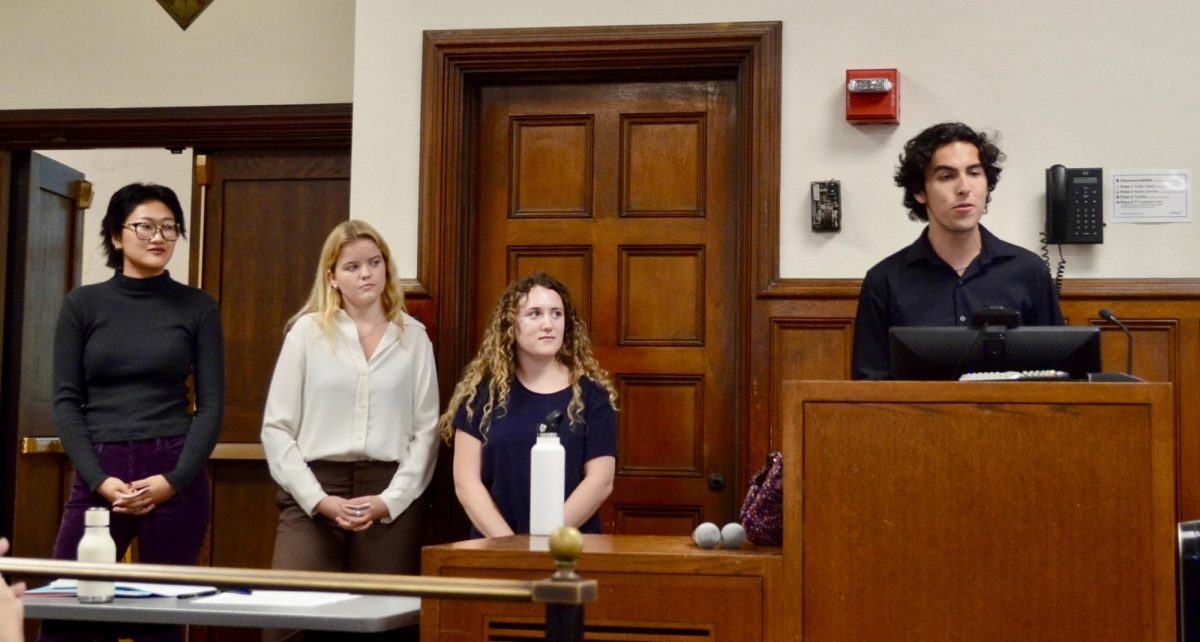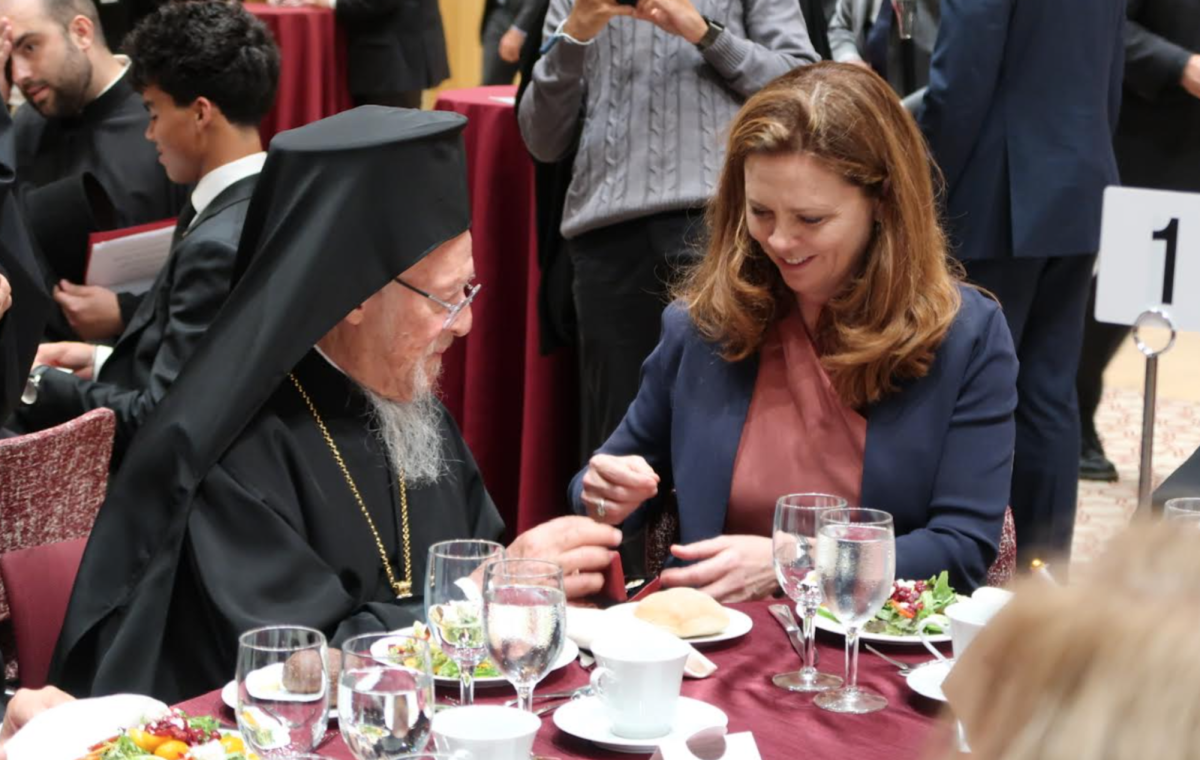Reverend John Anthony McGuckin Speaks to Students
By EDDIE MIKUS
STAFF WRITER

The Orthodox Christian Fellowship hosted its annual Orthodoxy in America lecture on Nov. 14. The talk served as a general educational opportunity for all students, even those who do not adhere to one of the Orthodox Christian denominations.
“The point of the Orthodoxy in America lecture series, as I understand it, is a way for not only Orthodox students who attend Fordham University to learn more about their religion, but for others to be introduced to Orthodoxy as well and see how it relates to them,” James Florakis, FCRH ’15, a member of the Orthodox Christian Fellowship board, said.
This year’s event featured the Very Reverend John Anthony McGuckin, a Romanian Orthodox priest, who spoke about the Orthodox text known as the Philokalia.It is a text that a member of the Fordham University faculty described as one of the most important in that faith tradition.
“It’s one of the great texts of Orthodox spirituality,” Zach Smith, a doctoral candidate who teaches an Eloquentia PerfectaFaith and Critical Reason course, said. “It might be the great text of Orthodox spirituality. It helps Eastern Orthodox spirituality throughout the centuries, how there’s been similarity, how there’s been change. And it starts with guys who are some of the very formative people in Christian thought and some of the very formative people in Christian expression.”
Smith said that he studied the Philokaliawhile doing Masters work at Emory University.
McGuckin’s explanation of the Philokaliain his lecture was comparatively an understatement, though he did not dispute the importance of the text to the Orthodox churches.
“The Philokaliais no more than a portable library of thought,” McGuckin, a reputed Orthodox scholar who holds chairs in Byzantine Christian history at Union Theological Seminary and Columbia University, said in describing the text. “But since this one was compiled by monastics in post-classical ages, it has patristically swung away from dogmatics towards the fathers’ words on ascetical living, mastery of the soul’s inner peace and doctrine of prayer.”
McGuckin went on to describe how the Philokaliawas able to address some complicated theological questions as a result of this shift in philosophy.
“The collection of those texts follows a more or less generic master theme, which is the search for inner stability, what we might call tonight the anthropological aporia, with the quest for the transcendental vision of God,” McGuckin said.
A major topic of McGuckin’s talk focused on the development of the Philokalia. McGuckin dedicated entire segments of the lecture to its two major versions: a Slavonic version known as the Dobrotolubye by Saint Paisius Velichkovsky and a Greek version by Saints Makarios and Nicodemus. He explicitly said, however, that the modern English translation has omitted the material which was included by Nicodemus.
Another topic that McGuckin addressed was the fact that the Philokaliawas responsible for several innovations in how similar works are compiled today.
“Nicodemus organized all this material chronologically,” McGukin said, speaking of how the Athenian Philokaliawas arranged differently from other works of the period. “It seems obvious to us moderns that anybody ought to do it in that way, but this was a radical change in trajectory. In earlier Christian times, such matter had usually been arranged alphabetically. Who can say to the Desert Fathers [a group of early Christian ascetics] it comes from A to omega? It’s not arranged chronologically, but if isn’t arranged alphabetically, it can also be arranged topically.”
McGuckin also talked about how the philokalic tradition impacted America in the 1960s. This specifically occurred as the result of new Asian religious movements and the incorporation of philokalic elements into J.D. Salinger’s book Frannie and Zooey.
“From the sixties onwards, Asian religion taught Americans that interiority was mystical, pacific, desirable and cool,” McGuckin said about the increased influence of new religious traditions during that period in American history. “But when they then turned to look at their Christian structures, they found things that were decidedly not that.”
McGuckin continued, adding a reference to a Buddhist school of thought.
“Enter the novelist J.D. Salinger,” McGuckin said. “Not only a famously popular writer on the wave of the beat generation, but also a serious student of Advaita metaphysics. It was Advaita consciousness from an outside observer that brought forward to the late sixties, that brought forward that shy, retiring maven of Orthodoxy as a viable advocate of mystic consciousness.”
Smith agreed with this assessment on Salinger’s work increasing the profile of the Orthodox churches in the United States.
“Especially after Frannie and Zooey, Eastern Orthodoxy became a topic of fringe interest in the United States and people started seeing these intersections not only between Eastern and Western Christianity, but also between Christianity and the Far East through this newfound Eastern Christian spirituality,” Smith said.
Reaction to the lecture was generally positive.
“It was, I think for all of us, a great and surprising presentation, because I would imagine that more than a few of the students came saying, ‘Aw gee, this is going to be dry,’” Rev. Joseph M. McShane, S.J., president of Fordham University, said in remarks delivered to the audience after the address. “It was captivating, it was compelling, it was very dynamic, but accessible.”
Florakis also had a similar reaction to the lecture.
“I thought the lecture was great,” Florakis said. “I came in expecting to hear a lot about Orthodoxy itself and only Orthodoxy itself in America, but it was great to hear not only about Orthodoxy, but how different aspects of our lives, whether it be literature, whether it be traveling, or whether it be the lives of saints and how they affect us and Orthdoxy.”
Additionally, Florakis explained the personal significance that the Philokaliahas in his own life
“For me, the significance of the Philokaliais basically to learn to how to be religious, not only within a community, but also within ourselves,” Florakis said.
Some students at Fordham may have the chance to learn from the teachings of the Philokalia.
Smith said that he was considering using some elements of the text in an Early Christian Writings Sacred Texts and Traditions course he will be teaching in the spring. However, at tpress time, he had not completed the process of finalizing the syllabus for that course, which means that the course’s content is not yet official.
Correction: In a previous version of this article, the photo caption was incorrect. Pictured is Archbishop Demetrios, leader of the Greek Orthodox Church of America, and not Rev. John Anthony McGuckin.







































































































































































































